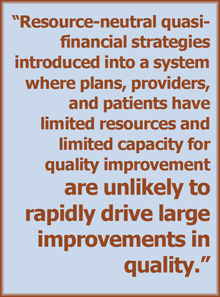Synopsis
A Health Affairs study examined a pay-for-performance program in California that assigned new Medicaid enrollees to managed care plans that performed better on selected clinical quality measures. A comparison of performance scores for plans rewarded by the program and scores for plans in a comparison group demonstrated, however, that the program had little additional effect on quality of care.
The Issue
 To improve the quality of care provided to Medicaid beneficiaries, some states have implemented financial or quasi-financial incentives linked to various measures of performance. California devised a plan to automatically assign new Medicaid enrollees to health care plans that scored relatively higher on five measures of clinical quality. Assuming the plans wanted more members, state officials believed the auto-assignment would act as an incentive to drive improvement. In this study, researchers compared the plans in the auto-assignment pay-for-performance program with Medicaid plans in other California counties that were not part of the program, as well as to Medicaid plans nationally. The study included interviews with health plan leaders and a comparison of scores on Healthcare Effectiveness Data and Information Set (HEDIS) measures in 2004 and 2007, before and after the program was implemented.
To improve the quality of care provided to Medicaid beneficiaries, some states have implemented financial or quasi-financial incentives linked to various measures of performance. California devised a plan to automatically assign new Medicaid enrollees to health care plans that scored relatively higher on five measures of clinical quality. Assuming the plans wanted more members, state officials believed the auto-assignment would act as an incentive to drive improvement. In this study, researchers compared the plans in the auto-assignment pay-for-performance program with Medicaid plans in other California counties that were not part of the program, as well as to Medicaid plans nationally. The study included interviews with health plan leaders and a comparison of scores on Healthcare Effectiveness Data and Information Set (HEDIS) measures in 2004 and 2007, before and after the program was implemented.
Key Findings
- All the health plan leaders interviewed for the study said that rewarding high-quality performance by automatically assigning new Medicaid enrollees was an incentive to improve quality. For some leaders, the auto-enrollment program strengthened the business case for quality; for others, the program reinforced their commitment to providing high-quality care for an underserved population.
- Most plans used strategies from their existing repertoire to try to improve performance, rather than implementing new quality improvement programs.
- Between 2004 and 2007, HEDIS scores improved on all measures for Medicaid plans participating in the program, as well as for comparison plans and Medicaid plans nationally. However, researchers found that the incentive program did not independently contribute to improved performance.
- For two measures not targeted by the program—postpartum care and cervical cancer screening—scores improved by small amounts in participating and comparison plans, at rates similar to national Medicaid means. For a third measure not targeted—well-child visits from birth to 15 months—the lack of an incentive was associated with a significant negative impact, suggesting that plans may have shifted quality improvement resources away from areas that were not a focus of the program.
- Among plans participating in the program, the researchers found little difference in improvement rates between nonprofit and commercial plans.
Addressing the Problem
All the health plans that participated in the California program and were interviewed for this study reported that the performance-based auto-assignment was an incentive to improve quality. However, the researchers found little evidence to suggest that the strategy actually led to improved quality of care for Medicaid enrollees. Plan leaders interviewed for the study recommend that such programs use more-explicit financial incentives. States currently using or planning to implement auto-assignment should ensure that programs are robustly evaluated to clearly demonstrate whether or not they improve quality.
About the Study
Between February and May 2007, the researchers interviewed 29 chief executive officers, medical directors, and quality improvement directors of Medicaid managed care plans in California that participated in a pay-for-performance incentive program implemented in December 2005. Participants were asked if their plans perceived the auto-assignment of new Medicaid enrollees as an incentive to improve quality, what their plans' response to the program was, and what the expected consequences were. In addition, the researchers compared changes in HEDIS scores before (2004) and after (2007) program implementation on five targeted measures (children receiving recommended immunizations by age 2, children ages 3 to 6 receiving well-child visits, adolescents receiving well-child visits, timeliness of prenatal care, and patients with asthma receiving appropriate medication) and on three measures not targeted by the program (cervical cancer screening, postpartum care, and well-child visits for infants from birth to 15 months).
The Bottom Line
Health plan–targeted pay-for-performance incentive programs that automatically assign new Medicaid enrollees to plans that achieve higher quality scores may not lead to additional improvement in quality over that achieved by existing regulation, and may have adverse effects on measures of care not included in the program.


